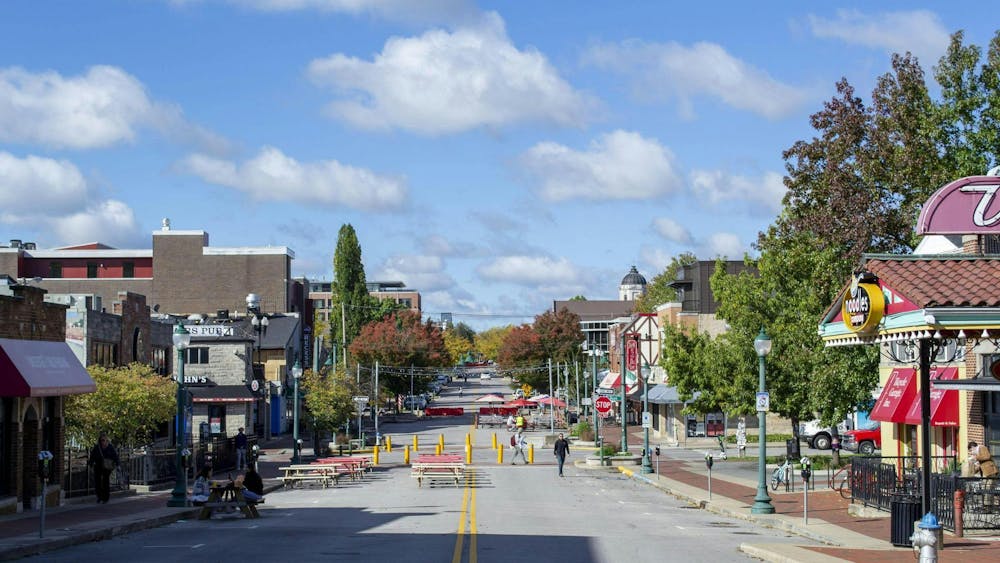Clear sunlight and a crisp breeze flooded a vacant Memorial Stadium Saturday morning, illuminating and chilling more than 250 individuals gathered on the north side of the football field.
Around them, tents ruffled and stirred in the breeze. They belonged to the American Foundation for Suicide Prevention, To Write Love on her Arms, IUSA Culture of Care and more.
They all gathered for one purpose and to acknowledge one fact: by the end of the day, 105 Americans would have taken their lives, and every 13.7 minutes, someone in the United States dies by suicide.
This was Bloomington’s fourth annual Out of the Darkness Suicide Prevention Walk, a three-and-a-half mile walk around the IU campus to raise awareness and support for suicide prevention efforts.
Outside of the IU Art Museum, participants stopped to write chalk messages for lost loved ones and words of encouragement for those currently in distress.
Out of the Darkness walks take place across the country to raise money for the American Foundation for Suicide Prevention to fund research, education and advocacy efforts to better understand and prevent suicide.
Cindy Moore, an adviser in the kinesiology department of the School for Public Health, co-chaired the event with Jen Altheide, a senior in journalism and the president of the IU campus chapter of To Write Love on Her Arms.
Moore, who lost her nephew to suicide in 2010, became involved with Out of the Darkness in part to find comfort with a community of suicide survivors, a term used to describe those who have lost a loved one to suicide.
“I hope that all of us here find some comfort, some healing and some wellness in all of our journeys and that we recognize that none of us is alone,” Moore said.
Caroline Walters, a junior microbiology major, lost her mother to suicide in February.
“Struggling with mental health is not embarrassing and not something you should be ashamed of,” Walters said. “It’s something you should seek help for."
Denise Fontaine lost her 28-year-old son, Norm, in April following his 10-year battle with depression.
Norm smiled broadly from a photograph pinned to her lapel.
“He was handsome, gifted, terribly intelligent and funny,” Fontaine said. “He had the biggest heart of anyone you know ... but he couldn’t see in himself what everybody else saw.
“If love would have kept him here, he would have lived to 104,” she said. “When someone takes their own life, it doesn’t take just theirs.”
Around her stood 32 individuals — Norm’s family, friends, neighbors and pets, all wearing blue shirts that read, “I’m Norm’s Buddy.”
Nearly all of the 239 registered participants had lost a loved one to suicide.
Many, like Fontaine, believe if there were more societal awareness and acceptance for depression and suicide, fewer people would take their own lives.
“If maybe help was available out there as readily as those with cancer, if it was that easy to acquire, that accepted, that known, he would have been able to get the help that would have made a difference,” Fontaine said.
The Centers for Disease Control report depression affects nearly 10 percent of Americans ages 18 and older in a given year, or more than 24 million people. This is more than coronary heart disease, which affects 17 million, cancer at 12 million and HIV/AIDS at 1 million.
The event raised more than $22,000 for the American Foundation for Suicide Prevention. Half of the money raised will fund national research, and half will fund state-wide education and awareness programs, said Lisa Brattain, founder and chair of Indiana’s AFSP chapter.
“Ninety percent of those who die by suicide have a diagnosable and treatable illness,” Brattain said. “It is preventable as long as we are armed with the knowledge necessary to intervene.”
Currently, two out of three people with a mental illness don’t seek treatment, Brattain said, though depression is among the most treatable of psychiatric illnesses.
This is due in part to the social stigma that surrounds it, a response that the AFSP and its supporters hope events like Out of the Darkness might change.
“There’s a certain shock factor when you talk about depression and suicide, but it’s an illness,” Brattain said. “It should have the same compassion as every other illness.”
Out of the Darkness Walk illuminates suicide prevention efforts
Get stories like this in your inbox
Subscribe





